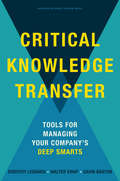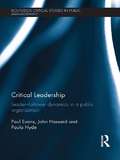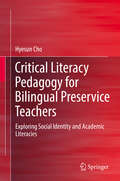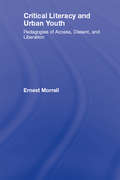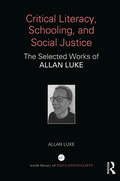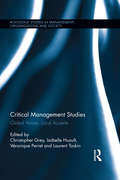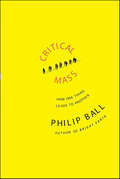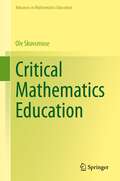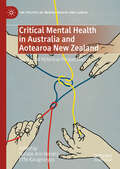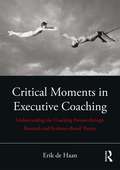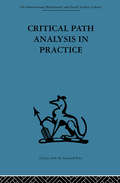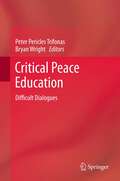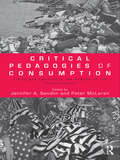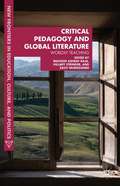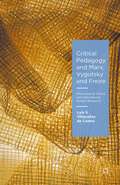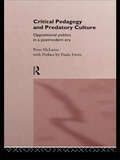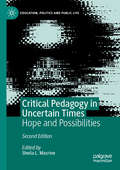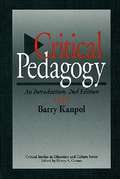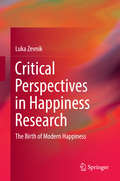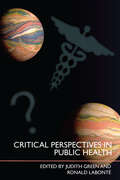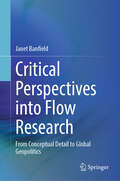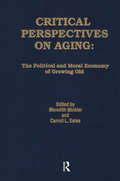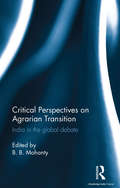- Table View
- List View
Critical Knowledge Transfer
by Dorothy Leonard Gavin Barton Walter C. SwapHow to transfer your organization's most important knowledge-before it walks out the doorWhen highly skilled subject matter experts, engineers, and managers leave their organizations, they take with them years of hard-earned, experience-based knowledge-much of it undocumented and irreplaceable. Organizations can thereby lose a good part of their competitive advantage. The tsunami of "boomer" retirements has created the most visible, urgent need to transfer such knowledge to the next generation. But there is also an ongoing torrent of acquisitions, layoffs, and successions-not to mention commonplace promotions and transfers-all of which involve the loss of essential expertise.Dorothy Leonard and Walter Swap first addressed this acute loss of knowledge in their groundbreaking book Deep Smarts (2005). Since then, managers have repeatedly asked them for practical, proven techniques that will help transfer those deep smarts-the organization's critical, experience-based knowledge-before it's too late. Now, with coauthor Gavin Barton, the authors share a comprehensive approach to doing just that.Based on original research, numerous interviews with top managers, and a wide range of corporate examples, Critical Knowledge Transfer provides a variety of practical options for identifying your firm's deep smarts and transferring that intelligence from experts to successors. Critical Knowledge Transfer will enable managers to: Determine the seriousness of their knowledge loss Identify the deep smarts essential to their business Utilize proven techniques for transferring knowledge when its loss is imminent Identify and implement long-term transfer program apprenticeships Set up individual learning plans for successors Assess the success of their knowledge transfer initiativesThis book is essential reading for anyone managing talent in today's volatile environment.
Critical Leadership: Leader-Follower Dynamics in a Public Organization (Routledge Critical Studies in Public Management)
by John Hassard Paul Evans Paula HydeCritical approaches to leadership studies have sought to challenge the normative position of leadership as residing solely within the formal leader and have gone as far as to undermine the traditionally held assumption of leadership as a "real" phenomenon. The book offers a critical account of the nature of leadership and management in modern organizations. Specifically it examines the forces that affect the influence relationships between leaders and followers in public sector organizational settings and thus, how these relationships inform social influence processes. Although the book focuses on the case of a public sector organization in the UK, the findings are placed in the context of both leadership theory and research across the globe and the dissemination of 'new public management' worldwide. By acknowledging the criticisms concerning the weaknesses of conventional or mainstream leadership study and through the adoption of a critical perspective, Critical Leadership provides a deep and rich interpretation of the empirical material on leadership, thus making an outstanding contribution to the current literature.
Critical Literacy Pedagogy for Bilingual Preservice Teachers: Exploring Social Identity and Academic Literacies
by Hyesun ChoThis book presents a participatory action research study exploring the social identity and academic literacies of bilingual preservice teachers. It describes the transformative experiences of undergraduate students during their participation in a program specially designed to develop bilingual teachers in Hawaii, USA. Further, it discusses how the curriculum and instruction in the classroom provide a ‘third space’ for facilitating peer interaction and critical reflection on such issues as academic literacy, heritage language education, and teacher identity. In doing so, it connects ideas of social identity and academic literacies of bilingual preservice teachers to the “real work” of mentoring and teaching PreK-12 students themselves.
Critical Literacy and Urban Youth: Pedagogies of Access, Dissent, and Liberation (Language, Culture, and Teaching Series)
by Ernest MorrellCritical Literacy and Urban Youth offers an interrogation of critical theory developed from the author’s work with young people in classrooms, neighborhoods, and institutions of power. Through cases, an articulated process, and a theory of literacy education and social change, Morrell extends the conversation among literacy educators about what constitutes critical literacy while also examining implications for practice in secondary and postsecondary American educational contexts. This book is distinguished by its weaving together of theory and practice. Morrell begins by arguing for a broader definition of the "critical" in critical literacy – one that encapsulates the entire Western philosophical tradition as well as several important "Othered" traditions ranging from postcolonialism to the African-American tradition. Next, he looks at four cases of critical literacy pedagogy with urban youth: teaching popular culture in a high school English classroom; conducting community-based critical research; engaging in cyber-activism; and doing critical media literacy education. Lastly, he returns to theory, first considering two areas of critical literacy pedagogy that are still relatively unexplored: the importance of critical reading and writing in constituting and reconstituting the self, and critical writing that is not just about coming to a critical understanding of the world but that plays an explicit and self-referential role in changing the world. Morrell concludes by outlining a grounded theory of critical literacy pedagogy and considering its implications for literacy research, teacher education, classroom practice, and advocacy work for social change.
Critical Literacy, Schooling, and Social Justice: The Selected Works of Allan Luke
by Allan LukeIn the World Library of Educationalists series, international scholars themselves compile career-long collections of what they judge to be their finest pieces – extracts from books, key articles, salient research findings, major theoretical and/or practical contributions – so the world can read them in a single manageable volume. Readers will be able to follow the themes and strands of their work and see their contribution to the development of a field, as well as the development of the field itself. Allan Luke’s work on critical literacy, schooling, and equity has influenced the fields of literacy education, teacher education, educational sociology, and policy for over three decades. This volume brings together Allan Luke’s key writings on literacy and schooling. Chapters cover a range of topics and theories, including the development and application of a social and cultural analysis of literacy education and schooling; a primer on literacy as a social construction; classroom-based case studies of literacy teaching and learning; major theoretical and philosophic essays; practical programmatic work on school reform and enabling curriculum policies; and classroom approaches to teaching critical literacy and multiliteracies.
Critical Management Studies: Global Voices, Local Accents (Routledge Studies in Management, Organizations and Society)
by Christopher Grey Isabelle Huault Véronique Perret Laurent TaskinCritical Management Studies (CMS) is often dated from the publication of an edited volume bearing that name (Alvesson and Willmott, 1992). In the two decades that have followed, CMS has been remarkably successful in establishing itself not just as a ‘term’ but as a recognizable tradition or approach. The emerging status of CMS as an overall approach has been both encouraged and marked by a growing range of handbooks, readers and textbooks. Yet the literature is dominated by writings from the UK and Scandinavia in particular, and the tendency is to treat this literature as constituting CMS. However, the meaning, practice, constraints and context of CMS vary considerably between different countries, cultures and language communities. This volume surveys fourteen various countries and regions where CMS has acquired some following and seeks to explore the different ways in which CMS is understood and the different contexts within which it operates, as well as its possible future development.
Critical Mass: How One Thing Leads to Another
by Philip BallAre there any "laws of nature" that influence the ways in which humans behave and organize themselves? In the seventeenth century, tired of the civil war ravaging England, Thomas Hobbes decided that he would work out what kind of government was needed for a stable society. His approach was based not on utopian wishful thinking but rather on Galileo's mechanics to construct a theory of government from first principles. His solution is unappealing to today's society, yet Hobbes had sparked a new way of thinking about human behavior in looking for the "scientific" rules of society. Adam Smith, Immanuel Kant, Auguste Comte, and John Stuart Mill pursued this idea from different political perspectives. Little by little, however, social and political philosophy abandoned a "scientific" approach. Today, physics is enjoying a revival in the social, political and economic sciences. Ball shows how much we can understand of human behavior when we cease to try to predict and analyze the behavior of individuals and instead look to the impact of individual decisions-whether in circumstances of cooperation or conflict-can have on our laws, institutions and customs. Lively and compelling, Critical Mass is the first book to bring these new ideas together and to show how they fit within the broader historical context of a rational search for better ways to live.
Critical Mathematics Education (Advances in Mathematics Education)
by Ole SkovsmoseThe book Critical Mathematics Education provides Ole Skovsmose’s recent contribution to the further development of critical mathematics education. It gives examples of learning environments, which invite students to engage in investigative processes. It discusses how mathematics can be used for identifying cases of social injustice, and it shows how mathematics itself can become investigated critically. Critical Mathematics Education addresses issues with respect to racism, oppression, erosion of democracy, sustainability, formatting power of mathematics, and banality of mathematical expertise. It explores relationships between mathematics, ethics, crises, and critique.
Critical Mental Health in Australia and Aotearoa New Zealand: Social and Historical Perspectives (The Politics of Mental Health and Illness)
by Effie Karageorgos Natalie Ann HendryThis interdisciplinary volume examines the social production of mental health and illness in Australia and Aotearoa (New Zealand). It draws together cutting-edge critical mental health scholarship from the region, to interrogate how personal, community, institutional and mediated relations, make and remake experiences of ‘mental health.’ In the wake of the widespread insertion of psy-considerations into everyday lives, here contributors demonstrate how the relations between communities, practices, professionals and institutions often replicate long-standing histories of discrimination and violence motivated by psychiatric classification, even as the psy-disciplines move into supposedly more transformational domains: digital technology, schooling, human resources, and social media, for example. The book’s chapters reflect the current diversity within academic studies of mental health and illness in Australia and Aotearoa. This includes a wide range of case studies from war trauma in the Australian military and pornography addiction, to the depathologisation of trans health and peer workers in mental health services. Critical Mental Health in Australia and Aotearoa New Zealand offers unique insights particular to the region, to students and scholars of critical psychology, history, sociology, medical humanities, and education.
Critical Moments in Executive Coaching: Understanding the Coaching Process through Research and Evidence-Based Theory
by Erik de HaanCritical Moments in Executive Coaching examines the change process supported by workplace and executive coaching, making use of empirical evidence from the study of a range of real coaching conversations and coaching relationships. It is both a complete handbook that for the first time gives access to a global qualitative research base in the field of executive coaching, and a look behind the scenes into the practice of both inexperienced and experienced coaches, their clients and their commissioners. Erik de Haan allows the reader access to the wealth of Ashridge empirical research in this field to date, alongside prominent research groups around the world. This book provides practitioners with a range of suggestions for their contracts, backed up by qualitative and narrative research. It looks at what research is already telling us about the value of coaching conversations and the impact of critical ‘moments of change’ in coaching, from the perspectives of coaches, clients, stakeholders and sponsors. The detailed research findings outlined in the book are supplemented throughout by case studies and snapshots of coaching moments as well as practical advice and insights for those working in the field. The book also brings forward innovative new models and concepts for coaches which have emerged from research. Critical Moments in Executive Coaching offers an evidence and research-based approach that will be of great interest to coaches in practice and in training, students of both undergraduate and graduate coaching programmes and those who supervise and commission coaching.
Critical Path Analysis in Practice: Collected papers on project control
by Gail ThornleyTavistock Press was established as a co-operative venture between the Tavistock Institute and Routledge & Kegan Paul (RKP) in the 1950s to produce a series of major contributions across the social sciences. This volume is part of a 2001 reissue of a selection of those important works which have since gone out of print, or are difficult to locate. Published by Routledge, 112 volumes in total are being brought together under the name The International Behavioural and Social Sciences Library: Classics from the Tavistock Press. Reproduced here in facsimile, this volume was originally published in 1968 and is available individually. The collection is also available in a number of themed mini-sets of between 5 and 13 volumes, or as a complete collection.
Critical Peace Education: Difficult Dialogues (Routledge Research In Education)
by Bryan Wright Peter Pericles TrifonasForward-thinking pedagogues as well as peace researchers have, in recent decades, cast a critical eye over teaching content and methodology with the aim of promulgating notions of peace and sustainability in education. This volume gives voice to the reflections of educational theorists and practitioners who have taken on the task of articulating a 'curriculum of difference' that gives positive voice to these key concepts in the pedagogical arena. Here, contributors from around the world engage with paradigm-shifting discourses that reexamine questions of ontology and human subjectivity--discourses that advocate interdisciplinarity as well as the reformulation of epistemological boundaries. Deconstructing the origins and limits of human knowledge and learning, the book affords educators the opportunity to identify and express common elements of the subjects taught and studied in educational institutions, elements that facilitate students' apprehension of peace and sustainability. With penetrating analysis of contemporary issues in the field, this volume introduces a range of fresh theoretical approaches that extend the boundaries of peace education, which is broadly defined as promoting the responsible, equitable and sustainable co-existence of differing human communities. In doing so, the chapters show how we can improve our lives as well as our chances of survival as a species by acknowledging the importance of shared human aspirations that cut across borders, of genuinely listening to alternative voices and opinions, of challenging the ubiquitous, socially constructed historical narratives that define human relations only in terms of power. Charged with vitality and originality, this new publication is a critical examination of issues central to the development and utility of global education.
Critical Pedagogies of Consumption: Living and Learning in the Shadow of the "Shopocalypse" (Sociocultural, Political, and Historical Studies in Education)
by Jennifer A. Sandlin Peter McLaren"Utopian in theme and implication, this book shows how the practices of critical, interpretive inquiry can help change the world in positive ways…. This is the promise, the hope, and the agenda that is offered."--Norman K. Denzin, From the Foreword "Its focus on learning, education and pedagogy gives this book a particular relevance and significance in contemporary cultural studies. Its impressive authors, thoughtful structuring, wide range of perspectives, attention to matters of educational policy and practice, and suggestions for transformative pedagogy all provide for a compelling and significant volume."--H. Svi Shapiro, University of North Carolina–Greensboro Distinguished international scholars from a wide range of disciplines (including curriculum studies, foundations of education, adult education, higher education, and consumer education) come together in this book to explore consumption and its relation to learning, identity development, and education. Readers will learn about a variety of ways in which learning and education intersect with consumption. This volume is unique within the literature of education in its examination of educational sites – both formal and informal – where learners and teachers are resisting consumerism and enacting a critical pedagogy of consumption.
Critical Pedagogy And Global Literature
by Masood Ashraf Raja Hillary Stringer Zach VandezandeIn one volume, this edited collection provides both a theoretical and praxis-driven engagement with teaching world literature, focusing on various aspects of critical pedagogy. Included are nine praxis-driven essays by instructors who have taught world literature courses at the university level.
Critical Pedagogy and Marx, Vygotsky and Freire: Phenomenal Forms and Educational Action Research
by Luis S. Villacañas de CastroThis book explores Marx's theory of the phenomenal forms in relation to critical pedagogy and educational action research, arguing that phenomenal forms pose a pedagogical obstacle to any endeavour that seeks to expand an individual's awareness of the larger social whole.
Critical Pedagogy and Predatory Culture: Oppositional Politics in a Postmodern Era
by Peter McLarenThis book is a principled, accessible and highly stimulating discussion of a politics of resistance for today. Ranging widely over issues of identity, representation, culture and schooling, it will be required reading for students of radical pedagogy, sociology and political science.
Critical Pedagogy in Uncertain Times
by Sheila L. MacrineThis book brings together the most important figures in the evolution of Critical Pedagogy to provide comprehensive analyses of issues related to the struggle against the forces of neoliberalism and the imperial-induced privatization, not just in education, but in all of social life through the radical democratizing forces of critical pedagogy.
Critical Pedagogy in Uncertain Times: Hope And Possibilities (Education, Politics And Public Life Series)
by Sheila L. MacrineThis edited volume, now in its second edition, brings together the some of the most important figures in the evolution of Critical Pedagogy and a number of up-and-coming scholars. Together they provide comprehensive analyses related to the struggles against the triangulation of Neoliberalism, Conservatism, and Nationalism, not just in education but in all of social life, through the democratizing forces of critical pedagogy. Its re-release coincides with the 50th anniversary of the publication of Paulo Freire’s landmark publication, Pedagogy of the Oppressed. The second edition has been updated with a majority of new chapters to address the current political shifts that have hastened erosion of the public sphere and public education today. These critical pedagogues show how neoliberal attacks can be collectively resisted, challenged, and eradicated especially by those of us teaching in schools and universities.
Critical Pedagogy in Uncertain Times: Hope and Possibilities (Education, Politics and Public Life)
by Sheila L. MacrineThis edited volume, now in its second edition, brings together the some of the most important figures in the evolution of Critical Pedagogy and a number of up-and-coming scholars. Together they provide comprehensive analyses related to the struggles against the triangulation of Neoliberalism, Conservatism, and Nationalism, not just in education but in all of social life, through the democratizing forces of critical pedagogy. Its re-release coincides with the 50th anniversary of the publication of Paulo Freire’s landmark publication, Pedagogy of the Oppressed. The second edition has been updated with a majority of new chapters to address the current political shifts that have hastened erosion of the public sphere and public education today. These critical pedagogues show how neoliberal attacks can be collectively resisted, challenged, and eradicated especially by those of us teaching in schools and universities.
Critical Pedagogy: An Introduction (2nd Edition) (Critical Studies in Education and Culture Series)
by Barry KanpolCritical pedagogy refers to the means and methods of testing and attempting to change the structures of schools that allow inequities. It is a cultural-political tool that takes seriously the notion of human differences, particularly those related to race, class, and gender. Critical pedagogy seeks to release the oppressed and unite people in a shared language of critique, struggle, and hope, to end various forms of human suffering. In this revised edition, Kanpol takes the pre- and in-service educators along some initial steps to becoming critical pedagogists. As before, university professors and public school teachers alike will learn how to address their own prophetic commitments to belief and faith in the fight against despair, institutional chaos, oppression, death of spirit, and exile.
Critical Perspectives in Happiness Research: The Birth of Modern Happiness
by Luka ZevnikThis book presents an interdisciplinary exploration of the origins of happiness in the modern Western culture and makes the argument that happiness is not universal but is instead a culturally and historically specific experience, characteristic only to the Western world. It begins with an overview of the main research approaches to happiness and then studies the important but elusive theme in the context of culture and relations of power. The second part of the book analyses the social, religious, ethical and political processes that lead to the emergence of the experience of happiness, including consumer culture in contemporary societies. It presents an analysis of the medieval Christian experience which concludes that the modern experience of happiness only emerged in the 17th and 18th century, when the ideal of human existence increasingly started to be pursued in the present life. In its conclusion, this book explores the concept of modernization as the collective pursuit of happiness.
Critical Perspectives in Public Health
by Judith Green Ronald LabontéThis book explores the concept of ‘critical’ public health, at a point when many of its core concerns appear to have moved to the mainstream of health policy. Issues such as addressing health inequalities and their socioeconomic determinants, and the inclusion of public voices in policy-making, are now emerging as key policy aims for health systems across Europe and North America. Combining analytical introductory chapters, edited versions of influential articles from the journal Critical Public Health and specially commissioned review articles, this volume examines the contemporary roles of ‘critical voices’ in public health research and practice from a range of disciplines and contexts. The book covers many of the pressing concerns for public health practitioners and researchers including: the implications of new genetic technologies for public health the impact of globalization on local practice the politics of citizen participation in health programmes the impact of car-centred transport systems on health the ethics of evaluation methods and the persistence of health inequalities. Critical Perspectives in Public Health is organized into sections covering four key themes in public health: social inequalities; evidence for practice; globalization; technologies and the environment. With contributions from a range of countries including the United States, Canada, the UK, Australia and South Africa, it provides an accessible overview for students, practitioners and researchers in public health, health promotion, health policy and related fields.
Critical Perspectives into Flow Research: From Conceptual Detail to Global Geopolitics
by Janet BanfieldThis book breaks down barriers between disciplines engaging with flow, by speaking from geography into psychology to establish geographical foundations for this psychological phenomenon. It frames and works with the multiple contradictions within the extant literature as productive rather than prohibitive, thereby encouraging collaboration across discrepancies as well as across disciplines. It incorporates new materials and perspectives to research on flow, including aesthetic theory, new materialism, more-than-human geographies, and critical development geographies to broaden the theoretical and empirical landscape of future flow scholarship. It also digs more deeply into pre-existing areas of interest within flow research than has been done before, for example, with respect to ‘dark’ flow, ‘flowability’ and (tele)presence, to facilitate more nuanced engagement with such terms. It takes a step back from the detailed empirical work that characterizes most current flow research to pose questions as to how such divergent, even contradictory, findings can emerge from scholarship on a supposedly universal experience that is purportedly robustly constructed, and whether this contrariness is necessarily problematic or emblematic of flow itself and therefore worthy of conceptual elaboration. Finally, it evokes global scale and long-term critical perspectives on the future evolution of flow to counteract the presentism within existing work that emphasizes immediate gains (e.g., performance, wellbeing, profit), in an attempt to pre-empt the worst ramifications of the progressive commodification and strategization of flow. This innovative book is of interest to scholars from a range of fields, from psychology, to business and human resource management, leisure studies, and critical human geography.
Critical Perspectives on Aging: The Political and Moral Economy of Growing Old (Policy, Politics, Health and Medicine Series)
by Meredith Minkler Carroll L. EstesThis unique volume brings together 20 critical essays on aging within the context of the broad social, political, and economic factors that help shape and determine the realities of growing old. Rather than viewing aging in isolation, it explores the social creation of old age dependency and the profound influence of race, gender, and social class on what it means to grow old. It looks too at such topics as the "biomedicalization" of aging; the role of business and the media in changing societal images of the old; the fact and fiction behind "senior power"; the multibillion dollar nursing home industry; and the role of advanced capitalist nations in creating economic dependency among elders in the Third World.
Critical Perspectives on Agrarian Transition: India in the global debate
by B. B. MohantyThis book evaluates the relevance of classical debates on agrarian transition and extends the horizon of contemporary debates in the Indian context, linking national trends with regional experiences. It identifies new dynamics in agrarian political economy and presents a comprehensive account of diverse aspects of capitalist transition both at theoretical and empirical levels. The essays discuss several neglected domains in agricultural economics such as discursive dimensions of agrarian relations and limitations of stereotypical binaries between capital and non-capital, rural and urban sectors, agriculture and industry, and accumulation and subsistence. With contributions from major scholars in the field, this volume will be useful to scholars and researchers of agriculture, economics, political economy, sociology, rural development and development studies.
